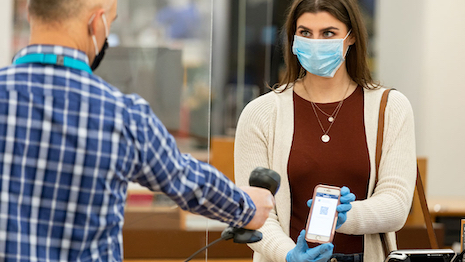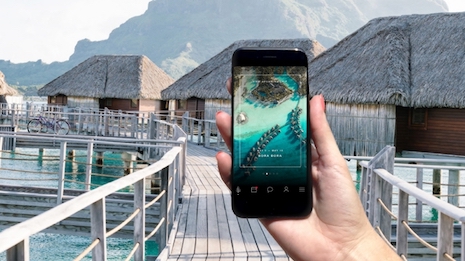Although the coronavirus pandemic is far from over, it has already fundamentally changed the business and technology worlds in ways that will resonate for years to come.
Analysts from Forrester have identified macro trends that this “new, unstable normal” will likely usher over the next several years. This includes shifts in customer expectations and digital engagement, which will manifest differently as time goes.
New normal
Forrester’s report “How COVID-19 Will Change Business And Technology Forever” first makes several assumptions about our new shared reality.
Among these is that COVID-19 will become an endemic disease, one that is regularly found, once a vaccine becomes widespread and immune systems adapt to the virus. It is also predicted that other pandemics and smaller disease outbreaks will become more frequent as globalization increases and climate change worsens.
As a result, there will be increased tensions between privacy and surveillance as governments turn to private data and contract tracing to contain the coronavirus and other diseases.
 The NRF has encouraged retailers to require masks to curb the spread of coronavirus. Image credit: National Retail Federation
The NRF has encouraged retailers to require masks to curb the spread of coronavirus. Image credit: National Retail Federation
Brands have become too reliant on data and technology and should instead be looking for ways to be less annoying and intrusive, according to a keynote at Forrester’s CX North America virtual conference. Forrester found that 60 percent of U.S. adults say they are not comfortable with personalized data used for advertising and they express this desire not to be tracked by clearing cookies and using ad blockers (see story).
While the pandemic continues to impact people around the world, the impact varies based on several factors. Some regions are returning to normal quicker than others, as is the case in Asia compared to United States, meaning that consumers’ behaviors and attitudes will also vary dramatically.
Many consumers are continuing to avoid crowds, resulting in accelerated growth of online shopping. However, as lockdowns lift, more than a third of consumers in the U.S. and U.K. report preferring in-store shopping after experiencing delays and other frustrations with online shopping at the start of the pandemic.
When the economy sustains a recovery, Forrester predicts that consumers will further look to patronize values-based brands. This includes expecting brands to demonstrate their commitment to customer, as well as employee, safety as physical stores continue to reopen.
This shift is a result of shoppers having spent more time about the environment and other social issues during the pandemic.
Brands will also have to embrace hybrid experiences, as the health crisis stabilizes and the need for purely digital events fades. Initially, online- and digital-only alternatives will compromise customer experience and fail to replicate the emotional connection of in-person experiences.
 Neiman Marcus has introduced contactless curbside pickup as part of its overall Your Neiman's service. Image credit: Neiman Marcus
Neiman Marcus has introduced contactless curbside pickup as part of its overall Your Neiman's service. Image credit: Neiman Marcus
This will impact different sectors in various ways, as shoppers seek retailers with omnichannel capabilities and travelers opt for smaller, domestic destinations in pursuit of safety. In particular, luxury travel will be defined by safety in addition to service as affluents pay premiums for peace of mind.
The most resilient brands will be those that leverage digital and safety enhancements to create stronger emotional connections with consumers, all while being faster to adapt to sudden disruptions faster than competitors.
Changing workplaces
COVID-19 has also changed workplaces in several ways, seemingly overnight.
Many organizations, including luxury conglomerates, shifted from fully working on-site to working fully remotely in a matter of days. Thoughtful, forward-thinking investments in technology helped companies successfully make those moves, and those organizations should expect to continue such investments in the short-term to remain agile and adaptable.
To this end, French luxury conglomerate LVMH Moët Hennessy recently selected software platform Okta, Inc. to seamlessly and securely connect its workforce to critical applications as the group has turned to remote work amid the pandemic (see story).
In the coming months and years, investors and talent alike will flock to companies that showed high-empathy during this time. Those engaged workforces and financial security will help those same companies become even more competitive.
Furthermore, as remote and hybrid workplaces become more commonplace and permanent, Forrester expects urbanization will slow. City centers will not see busy office spaces return anytime soon, and it is likely smaller cities will benefit as urban professionals seek more space as they have more physical freedom from the office.
This is already materializing, as one in four people believe they are more likely to move in the next 12 months as a result of the coronavirus pandemic and continued fallout, according to a new survey from Knight Frank.
A desire to upgrade their current primary residence is the leading reason for respondents to consider a home purchase. Coronavirus has also influenced what features home buyers are more interested in, such as more outdoor space and a home office (see story).
{"ct":"9uHQNlw9qczpaxVtvr0iiYFQEratLVccDBtzSWFznVwZD2wCoYMb+RKOPVWJ\/aAV+OWneJcNxeaoIDg+uH8D1SDNAErjSDA3iboI79E96VjHPt9imK5PoLGbSJd\/Wp2H7Qj2vv3a1cmY+H5pk2NH5MTKb1mtcS+vQfqa3VgMbD0YxFOK7Ff03+7J9i3bNAsEscheGWmEGk9KvsFF858p7Z\/ahaz+m1LnLworGKKdr8c5L+YlNqcCCY5DHlAEVWgUJEZdCKaKc1MZN09uePAhX2EA2H4cKqqY7rEJbupl+Vm6tbNOeVTkihzGcxjrTtDuSdUSjPtj8e700JJnjUFT1IeVBkw6I\/h30JpQaKi2NcB+68zdN632iS6n47y2p0a3ymLuI2OY5O7QhOvLpG2Oyq8J3iZycuLEOwy63aFAghRYqSpGYo\/h9xz8YZwwTciOmZpC4cO4veZPmb32NqCv1rAiU27tmBt9kJDhZIPdHZMSYj6yJN7q\/5sn\/GAJeypk89sbu3SIP0jgcAhSco9VaEvQgRCOGARKrHqLinNk3cb4AE39HynBA8\/2bXHhWd1hDVMrM7TwVkB\/i0SJT2Q5dOkNubrwadr28IKcep\/3jN3FEvlORrRcn\/JXVRbVx2FqniHtqweoLNVA12QDUL0U2Yh5u3wcVfN+j8p98lPAyPVnL3ySE8x328awGkrcKL5qu5\/nQDHKzVRS4QRqJXiuzm+BAOUAT4s4cZIlGnFbEo9KNsWXZO107i8\/RHUNikmxFD6zaPh4s8LL7lyDOBxi5CJiBDZsjbVYXm3N7zjAMi9PZFZeR\/0NB1fjI\/H4Ock5AWHlPaJTZEpZhnvt6dAi8zGDtCtPhIVNjXMfSkCb1CHbZebFkaGAcSdEYc43S9hlbtfM+ZT1IXCyygM0Su8aPrd3JtVtcTM6pIT2Zg5lpn\/OYHIlCubZpIcmIAbH4t8M6YXmJlFdzkZrMRYFY15kGjEcmYNXUwa75y8cD5nzlvfklzEeGjn8rvTk7lq+VUh77OOghfY0TE\/8mHrj2PDACjLXVPK\/ixr\/idD4g2KUAhKnLUuwux\/ZhGc7\/1pvhvq+YcpNZr0fuvyQO8oXq+3ltP3EYO2r0C+jFDOx71GftdaIW1LimHuee0i5Tf5spV8vL0WNeizTALQgBuQBgJbmPYVWQ7sIQbxlMfn60wU0Oh4Cdz2yet\/cAFeveELfg54Tf60eSyNPsgk3ANVFtL80\/cu18N9ESUCqcXdgO0XH\/8sXxzagi3zGEGu6L8TBppUNEGE4MgIkx1oHDKdJ+QoKjWxtKVxx1e7Z1Y\/9UNMhWk0WjPwAT4y3dHvEk1\/7JFizemMu8wwICCPwT8SZA4Gik5gkHWEKYdaMHqWhRgsiqOP2nwgZNKcIAIq6t5+l+3wUokzZRNNFnEY8ETj2NRz8d6\/mb0a2tiCJ9fhuVTqEGUWTHjr5MFP8wUuu2vo9C6y7a0d6JMlF1zpXW\/qU9haLjzo9H6oOvf7CLQ9vU6S+KpNmmCpyI\/pSZ1ZleQys4Rr7ouVcyJSDUHBiYejPzOeHd3M79k2Vi8GWMXHdyU4CmZVh+da+8C8j3HGH1YdRSR+XquhF9w6ZiVpr3czXV\/A1\/+hh6RrcvzVL9oikVuD\/S6WCWQpa7VEqnZVD6xGCCT7Ct+b1Lb+60vurpwNE5VusfWYLgGg89MiEyTzygYMaPpI22zf0iIbYtr8WjHxadIbthJdWQn7qjPUW2jAFqRfr2UZQHYblh705foK7vqtQXW\/DiQLxAvv+8WHMQ3eyyEFRwXWr9tub5JRS3Mzoo15MB1Zv4wBFaSce5NP5gsoXeUlUmhLvibY01FR0OMyQfk0+kzsgy7eWuR+mZnEwrBB3F6atQNiyQLiN8clFcROiU0Ez7Lnt2YXv9UCpCvZqbtxnBIhXlTGzYiczHQbBYoz7Wfqwrv2vaeV0IwHoOH2FBL4Pl2MoKOGq81JUWjzp8KwU\/Dv158QAKx0K60yFsIRcNEnAVoCbwiQC9U2TjLToUmGBkuRHpqOk6NVrOVXpBUkU\/wUiCeTLcJW1+4A2kYZQJDhGjLs7e72bX3Y\/XTcI\/aZBTE3+D2UnKUkhqA7j9aOGdqTodyVVV5Cx+7LqEA06vmJa99\/DpuQKqR5kxRJ0cw4nbwxvxdM5tbhbidDNxLZb\/7AI\/z4\/yM\/WRlC1fjIlQ0mzOSwscrNQxvD6NSDKtrTstgG3a1VDyMrQiFpzMFNLvVq2g1hN63sfYgTm9RqpcdDLzUajPxlTelYVtex07KAzc4Df\/Y0pwqN3vikwWd5dqlyZ6aeRvpJp+sFhtUfWYFWSfYTKN5445PueiaHaH7TKc7OHMrmNNd3CgRJumx8foQdYFAMIxTmdxV0JnzC8U+XHxKhss4I6FZUEbEVHmf+HoSECJA3dt9LjhfaV08ZjXoGlmklXnmxzNV2t0p5KsK1vyELUTD6CXpl4rt4X9kOlqhCE0+ZahXcULr+mu+VjDgqbazXcGwT0Q0Q0sHqMJvpsImFl9mvWqoO\/PPT2u0eZJsY7WP2vv36y+9+KYrR3gbiCPw4HeXPNN+StWqfTfVUNKAzw\/cRu22U96V6mVto6hwQiaD43Xskan4f1gAQjKwInN+JQZOde+KZH+waJq8LKmhW4zloQVeu5OuDxoUwUwYl2IZpqAyHGADJmaWbOdEqkdeAC9Sg149IA5IB98NlHiUEtZkBC5AgJTdPpOsLRVfWVZx0Ts1oYW2\/byG06tuHidRRdFHgfU\/p6kw\/8x4bKP29we4OdOqnK+oPkeN\/CRCXJQHeIvfuep1lBP\/lg9tQ4X8wJFzUoCtbLAh\/Igfg3SiGFMYKF\/H6T3Zdomc07RgIEIG+b51pc593F7gVmUyOz+DVed\/X7GKkvO8Bfl2GjjmIboRGgzskdMUDMy9BYEZqYbcSRxLl2KNhi4abIiT2vef6C6MYjzdHmfK8wl48RtV1Rva7yqRfz96lVjTOFZ\/wITMaDa5x6IBlOjamXGZYbp3XNdS5iFq1DpNMjR4AQnSX8kTAjmYWuRhjKtfWWcxqH9WbArukRH6lGvHkmWiXRcsqhtzqeAaMOXOB48peeEIzfjvHR3Rp4PoFgJ2Lf4B54NlHDft2hQ0sTk8MkuEww1sxIVY2eu1FnoBjioOhkaiAC+6i29WRo2+BUXDupi9F9WL8gqRm7zs746LYBrr+1PhPqDxm46He9hDH5xszuQgN55hgbjT+3L2BDWOJRrqc4yejfkbf04w2Isx4EEUATe98FoDQiT96EHdyDL0DBeOrT7srF92s0XWwc7XABPPS4Rrc2wiMFvokX6ME1jZzQALuDdsD8xxYLOESQznGlkDEVJRAUSZ5zeXxfFvY6N1Bslosk80g9rFIQarnkWsVG8J5eSy1N85NyrpXyn40VKs1veWISOn\/tndbNzlev\/cXlGKtAmla3yeP\/y5qgfZwo2aAl7J7fAss\/LkVXrqNHJdJH9gM3zSoMeaVf7POcYmK1O4K\/hSy5GTqOXQtDtI2hh8C8\/JzD1F0v36iMvInXcYo0kD9eD+4jljJDDg9Ia\/RsY8Myp1AzET5VUv5J47F4o4IyDEK0EpXvHdt8ZGgBauOhGBg\/WAxNthH7oJRLIdobE\/xfTIdVo2P9c+cGPTwad6beDsZjCNOzYf+lY8iyR6dSATHgFa1xGxFNlNBokzyK0Cbrji+jwJcUx1ttxuiG\/an2yhED\/lTJpHh7k7XdBHvbtkh6785cjiH50LkV8PfKfe0sL9voqa3fvtiCaHBK2lxDOajpVB9IuAHWX+GOGAB9PS0mfNQr\/MpiMGBAsAOhxHYU3UmupZccFK++Bo0gP5GrETdRbAQjnKgzajralpowwLvGSG\/JrCCCAYK4dyj0sdFRma7xsiYB3PIeDBNmVWBLehV7NS0FXahnUhJq+ehBAy4vcfFthJQ+IG9keqUmQoGuWIkoVDFnzg57QxwytLGclalSFzD+jlLYzdWLu6RVG2YEiz9SrS2pW876O0JYRsDXBBGteSu1vmLiMJDGJ\/zDyilSwSemf8jRvTTb+KDmCd65s6758U38O5SJUgvaCiV9mnc4NLyoLlD6gowZwA7J5nIi7HnvLjNy6RMqOb6NrgY7cKUBC8DVmc42B2wiR8U5g3OiVFOic+pXcm6Rp6Z0pGPJZztkzuyFGjd04rQdiwmrAI1bjc9D4SzJa+Ai6E35ufclqrPEBh2F\/7KMvbTFtwb99QDMcN1\/jjcTlygB4T9Oqg5GLa0uzOeRF5uPrChMq+z8UZ5D+WEbbVkM7bwCl4PfkarGHgfj53wIchryeSZhjLI28n1VEvTMQ9rjgzUUIi7XXDK3ejb9y+8tWiziFCI178t6GbLC3vW9tsf9NmUet6oFvMgQtxLAXBYzqtXHsC5ctmOLR8SlV7W10a3mGc4U8IaobTEr0rDg4Glg9syujRedKFhm6Xz2whAPY\/UjEyTOT1YJNGahV+eHj5y5TW9vaFHwTeGWzTmtIxCIfsc\/oGhAjxH0bq6x7kE4QGq7poaDhe4FVQW0z+o\/4m+FfnbSDby35yARlDJRvfutq3H2ms9lh9IsGXhB0ONKG48WmuNPFUsn4S0M1erySCl8gfTBHKKRhXET+IHtTcDwu4E+0VIprygZbLgjpDbW3uuwRDaRMFRkcO2++0uyQNuUFyT01V0WtDHz98jU6QI7UTTaVm4hhkwIeqmMu+MmS6hdNtH7\/Mn+0TVZMDzHiemp9Fbv\/s+RhQj+1oOz8Yfd6VIjjzAha86xFfXKK\/NBkX2vYNWLtMoVb0mgTfA+JFq0Yh77TfjI3akuqzphV52qJe5zyO8VljC2lVv2SO5JvLqdaK7RptVT+fTLEE\/4xRw6a3wKzQxjINLK5jp4\/mnSrtlQ0aMX0ekHGS\/gUbWxsA3iWLrcNtM1ODHB+8cYDaDD6fmEAfGd\/KicLeC2LW7+oRb6jUCFsF1TYZiLG+kN+qjlPJwfmcs5Xgn5bwOMm2MBjcw\/WX80VwVVVnBBgsgf7A0NVEQhf+y3wyywzxwGRaFUskYJkzISAafAQWIGpqQ6agRlPNlF3YCJhtWHpo71y2kBNcBuvmr4jiDAWOEtXcq10PW5Kxmdsh8rIkKUSoaZkpo9bKCcZrcEmIRVnak7hf79BnDYD1MiTIBKqzzQBul3tzQvdz6pio2lmJQC7J3h2j5UBLBlszPrwnbFClqoEbiV6s5j0Ixco\/kXQsgYCR81Q2b8mttw2R+3u9Bsv1mhg2E2E3pIGAt2UP81hH7vzM5flmz+lMyZzR4aM\/wLOyXVs8dLW\/q+zXxYP2iaAxqrSgaVAgajOD5tI8WCqyViniG8+yRKTPnYdo36OLEpYN+zYZlK236+2FAXzOeH7wsFSSRXhPU2A46gPnX5wicpGOQ3bEHRtrUys\/\/PpyBxQDlPhw08\/EDrcRpO9p\/GvWhZr+EeENSrM1XmXsNI4LDY\/l+95xsM5dB6Sf3YhGBC6B7W\/tvqBCtxvyuYf0hiUwNf5TYsjlu2szDOhbmUnhQDfav5dw8i\/bWROdMnhZ92JTTS\/aCJ8EKB7mUccoVxYYKxSwsXPgYbjnqkkKA+Q\/bfAR0k7uSbzf3V4wgDga7NHiVPoWRbapdkqqL3mjqWf2Lj2B\/UIXhTQv38HD+OzrjfJfN6FqMz2DTKgfz6cII8dEbpu+e4rV0ERZpqPH3agce+wBIXg87SSIF7FGFfRnk\/5v7PKVhrssu\/n4nOYb6tGPDPr0PFJqYTQQ5SfDFfbamIrGPBOCxT3qhf+Ea0RfiDaq2mU2UXCEYaWlH2uJM9HKd9n0GO7xQx5fGibp\/9I7NO3nBwoBezXKNCTEwuzXVhunXqjAQv\/me5UBRscvSM0vcxz393yvk36BBhbj7I\/a2nM7oN8kzdNyxg30CpqT4vaaVm\/V31T+RGVqd+AxN\/3PTRyjA3ewZjw8UikMvtQ3ntB3uiIid49vTuQzCa6m9wu2WeE7XpVoKYQg7y\/3nGEbt5tyXjLmnYns8WwSslTcRwJtMuq4Qou7JxmXot+DnO\/BZ2BOB0zqLCP2UMZEnJy\/hwRFJkQikfdKtRN9UU3ynT2TLshSEsR0VsVXmUeKMDA4tgDl0A5EdMAeUUUfykEGldpfMP2RLmHkPaP4KPePT2txBYQZKLecDNeSuXyQDQ9VhRMOLdRlTSpiffV6WXF8WNndJOgVovNwyoxEFjQCM0T0oyYqBu26qLkF\/QAXc97r00PL2zdvGOYWNA6w88aG5CjcZ80kca4sRKYzYmgaiK+GpNQIhMv+pqgFxFdvdlCyf3U9tAVjTpaU0pBuy5mAdDeltswq8X\/fN5XoEXgads5+Cv0HNCm37eYQjsK8hiSFUoyyBWvcz\/X8XNHchm7YxA22XKo9kNWE4UFokkcWA3W10\/Dq9zOsIXdznA0kfxTPsuf5FQhr+uK5j0gfuD9f3DXBsT2mzeMY\/AZfvrqiutMEjPV\/LzrdhyswK4\/G7UARUP1oexsuPmfG\/hb1XPnYD0NqngVYyKaUPit6VZo1s8c4XwGtfACGPbPqwe20HXRzLO6JbHLMgsTikKndv9LsH3JCC\/U4R009IvLK83mP7qdeGJmfQSFKZug0z+vlS8PGlG+aIHxYaPFv92tJ43bc+fLMRbd\/OF\/ToPC9SzACN16oXGWtGeVJsJGo02JGB6pbHyLQqoQkOq9WIPgQQDYxczdTQf6J7odQo1tns9FJu1JjZjk\/O+CDGgGoEMfPjJUYzvuSgbQohjKLQyJ+Azv2Nb8AR2WL60\/N5QYmpoB3rMN6kPRT8+zTeEVS8Li28Y24RRVVhGJVXC+mEsDKlW\/HaaEFOFwdEsFSU0k4M2daLyiTAZE4cZuzzgBo1CzYR4l0aK\/\/tA3AN6AxrP4641JHFXNq+5tHf2Wtko0A0ZOpkcoESTxz4BFjN52EKmJF8IKWnOMRv895c8uiGNCmZK6YXf8U62Mb6Fn2M7cR\/skepXL3o4pFXOSDirqG+h9KQKue\/WrvBLt5AH40pjROkqVOY+6\/vfVVGUxqIFNDuQU6AcaNgkbWrSqIRwsz6ZrIShQ4Plf6t8Mg5RTyBu3jJ7nYv\/WKEVWGaBimZTCEJzcHds04Kcf4cL0m204NjlSa+qfoFKuv3Z3pQkK9W7x8RXVykiJe6c4Fi3HmG+0gQbDStWImcyhZ+hBJRvAZJSfJlPsMWAm05RQUQFqHt5NE55yexRr3BCBwIZLl2FnmiFeJKt1W56SnnwMgmxzvij4ulVGsY1tYhpjSlidnxXet+MgTzApCyRIQjiVMAp\/hhA\/WogTc+BqUynmh6iDK1cHmzMi5AsGuBS1ARScWGaNdtIZTAW0vNcWXf5HILpYJ3nIgJyvUco6eAKSlRVbkruVjgNv0E\/h3bZyNJWSeeGM4FT4dZZkINlqp3NJ0YszBiR5E8QQNS184qjO6RZju1EoWBBZau0+DE5+xQJWryW4nLigRHH5nuWT+jnf+VTIMqdVCTC8hqffj3AAS3PsajWhaqnZnR6G8T4huMAvcBH0IOqjRSbkjCH7Ff3IUZHeopsyQsRDuaUxXI99aQjoqwweLRwmc8RbgUqBWf6b6S5hPZVJJJ8puywX+0FyQepZhWcXREt0v1ROahfgfVLN6L\/uORESezWlQl6erLRkQC9hYdoW6ojjYnSgUbRoxJty5oJPHRnoxoYqJNegrFg5IpWj9QzSYw0xK4qKaNycxVfylqS1om9ovUldHVxEwMrTXuO\/X2udNte7pJUqlQFCGhAy4xw5fJ0Kz58R7fsLX19Ju+ZCZIOAwY5l0QfPQausKoI+y3E7lMrELkKHvhOQrloKBjeEZr6geaSq4Ddta+qvB1YGiLmI5Ne915rdrxvhJxj4S40\/T1tkkP1qusG\/2WT+NttwZYWm5LxxFuDsjsxARHh3lwqChT2wV6RccP525zUkwdWXnjG\/cN\/OiygEE0q0knZHbv3JtOGYISzPSYM9\/SAsoiZv3NDyV3VrOsPpUdKDUXvdLCe9SUtPIm4E1w3F+IaYwrf3L0mPvwWMHM4sh7qJ+ZlvArRJISSp\/zz1caytVkmC6wj3AUL+pfmDEIdpMdkBXrx5wAyHx4s5zWms1aPfrWoIqAJPacZWG+893MRYcEbN9+V1xmB7CA93VE8H1oAt5SBOXViEVp1hr5yZDbtgQdQ9Ty+gy2mStg\/o0Ni7HN64GZLTI2F2rFvxhlK\/pY5jJzlHQZRFZrYs1Zj2i3Nd7SXc0HjbPUv96IoVpq+iA0rsX24M6NOK42WXCsbCF2TCR0WWAn2VvnviDi4sGnpyGOS\/XGY3jdPWE1bmwSBQgbzEjqxZkpUBbgIQLAuxxKZLrvE86j+aHFA5xiuffW+DKLn7mQGKwb0NpnHFRfSbNyEVs5rye+R4gAlfcguQsOttZiXxotZV9oSklaEntUBfHn9is4NsQv6BB0fq8exRkaXF7vihrnfZR5CPoV5FKvyqGHfetzdZGdDy\/9wTxX\/6Vu3WuGw9I0gqSc84OIWqLG5uxtg4myqC7xVyP38q71PdiY\/Co\/tztOmaHXoSTHvZalsLt40IuraPb8J+x\/qo0+AwnJU+Ke4op3+wLxhppgBFOuW13TD2BX1spNSkfFhLnmfrY2dSepVb87G9eE4zrknEnZviVcCVqQ6fP6dqQqiEjYv4rdpD6DWttGwe5lkHwhTx\/RBo+DN42MGJKZv1r\/C197Oae6UEUl67lX1z25tg6E4s6kxfvqM\/EVt0592h8Rzx\/qSqg7huSDr46I9KcqQFm136UPMjGk0D3gYjsAerpp1xGbBtdZ9JkLlYEZRcrEVmCJotGItChZehr4eVtshSu7\/8m3ip+BctLHSezo3wEj37qDZ70KS7GhqrqneB3TzeZWzS84CPAdnNxo9ywf8HXIb4TJB8LBMutBSOGt5oq+sIc0doOcZWS\/JWMBiWnPgIyircHjmSy+BEvfBIaaVp3mZd2L3rnysjawprKFqQaJkK1jl9eeh3jmip+BYMgGm8ty4BtVoY2QQ4KEmRMa9CQMZ7ZT4A5K59mACpfVznB\/HB7guKu57tWSYcma7H1AaX33U154eaIoFvFGRMdMshmFsqENpu4XplGKD0TnEITjbdKv0t27PHn7hSgPu77\/4pa8P2\/SDgSJ49755+BhBho1djprtIRE59\/jTtHdyfqZW3Hpo+h8ZTQd13yqZiZOcKriP\/N4BlAilzKOkCimHaZNf1zLxRfT6\/5g6pmb8AYK8uAjzseZafKqbANTBQDYpbwBD6tVyXz9+","iv":"fbe66412e67c8ec47592f844be2c1c94","s":"a1210dcea60252e7"}

 Hybrid experiences will be all-important in a post-COVID world. Image credit: Four Seasons
Hybrid experiences will be all-important in a post-COVID world. Image credit: Four Seasons
 The NRF has encouraged retailers to require masks to curb the spread of coronavirus. Image credit: National Retail Federation
The NRF has encouraged retailers to require masks to curb the spread of coronavirus. Image credit: National Retail Federation Neiman Marcus has introduced contactless curbside pickup as part of its overall Your Neiman's service. Image credit: Neiman Marcus
Neiman Marcus has introduced contactless curbside pickup as part of its overall Your Neiman's service. Image credit: Neiman Marcus